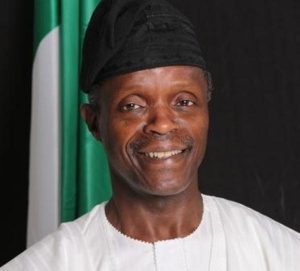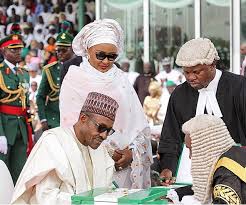
APC National Chairman John Oyegun

Vice-President Yemi Osinbajo

Ahmed Bola Tinubu

Atiku Abubakar, party mandarin
The Buhari Presidency is far from being out of the woods. Two gestures from the Senate in the week flash messages syndromatic of lack of a well oiled relationship. The Senate turned down both a presidency request for loan approval and virtually so too for the list of ambassadorial nominees. The same Senate kicked a few weeks ago against a N309bn electricity bond. Coming on the heels of an inconclusive contestation over the raiding of the houses of judges, there is a context for reading the gesture from the Senate in terms of the totality characterised by a highly publicised intra-party feuding in which the national leader asked the national Chairperson to resign.
At its wider level, the totality includes what might be a feeble struggle against neoliberal re-assertion and take-over of the Nigerian economy which was thought impossible under a Buhari presidency; claims and counter claims of regime take over by cabal(s); a rancorous debate on restructuring as a measure of elite fragmentation; sale of national assets as resolution of the recession and the controversy that followed; contestations over the president’s biography crafted by Professor John Paden; Shiite related violence in several towns in the north, President’s wife’s interview and the knocks and kudos around that, particularly the president’s interpretation and response to it and, finally, the release of 21 out of over 200 school girls snatched from their school since April 14th, 2014.
All situations of this nature constitute a challenge to the government of the day, primarily the president and The Presidency because, in the typical ‘Third World’, a huge percentage of virtually unmediated power at work lies with presidents. This probably happens because the state might actually be over-developed as argued by its proponents. That is, over-developed relative to the private sector and the civil society. But even if the thesis of the over-developed state applies or does not, what are the specific plausible explanations for the kind of situation depicted by the signature tunes from the Senate and between The Presidency and the judiciary, all suggesting a regime that is not in grip of the arena of power? Intervention attempts an analysis.
Yemi Osinbajo, the Vice-President, told the story at the 2016 Annual Trust Dialogue of the question the president asked him regarding what all those faces peeping into the bus in which they were being conveyed to a campaign in Zamfara were actually expecting in the event of victory? ‘Instant change’ was what Buhari himself replied eventually. What that dialogue suggested is a critical awareness at the highest level of what was on the ground in terms of popular expectation. There is a sense in which the subsequent construction of the regime around the economy, anti-corruption and security responded to the popular expectations but then, there was no mention afterwards which perspective would tie the three items into satisfying popular expectations. In the absence of such a framework that was inherently mobilisational, the president lost the people too quickly. This is especially as the smart readers of a discourse vacuum moved in by waving and reinforcing the neoliberal ‘alternative’, before the president. So, a president with traces of state interventionism, manifesting same even in the interviews after victory and who also started with indicators in that direction was also to be seen implementing neoliberal electricity tariffs, for instance. Analysts of this trend trace what may appear the shrinking of The Presidency to the near automatic loss of the substantial number of middle class, the working class and urban poor to that ideological turn-around.
There are those pointing at how the president denied his regime the benefit of national consolidation by what has generally been perceives as too restrictive. An extreme view of the totality of the appointments has called it an Islamisation agenda. As the framing of an issue can be more crucial than the issue itself, the politics of naming involved here is not a small matter in a diverse Nigeria.
Similarly, The Presidency is believed in many quarters to have created problems for himself by either deliberately alienating the party or lacking the skills for building up a party. Without a party built up to provide the organisational backup for presidential power, the president has become vulnerable as to have to negotiate with sundry elements, the same elements who, ordinarily, should have been overwhelmed by corresponding party wings. Most cited is the situation whereby a party led government pursuing an anti-corruption campaign has no youth, labour, women or student wings that would take on those perceived to be fighting back. The wonder is what sort of party might this be? Last week, 50 NGOs were reported on some social media sites to have come out to agitate in connection with the case for suspension of the judges whose houses DSS operatives raided in early October. But that must have been the first time any such number of NGOs came out in recent years even though the APC has been around since 2014. Instructively, former president Obasanjo is already referring to the APC as being in Intensive Care Unit, (ICU) while talking of a Third Force in terms of a political party. Would Governor Rochas Okorocha’s shuttles now make the difference?
Is the president too self-righteous, suspicious and stern to attract and manage power productively? This is a dominant perception in town and it is not a matter of whether it is correct or wrong. Perceptions are not about right or wrong but the fact that they drag those who hold them. As far as a unifying national leader seen to be above street wisdom in governance, this sort of perception damages the president.
So, is the president making that make or mar move, in whichever direction or arena, as far as it is something in the direction of that thing called national rebirth? Or might this be a mission impossible?




























